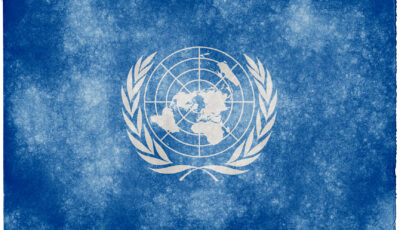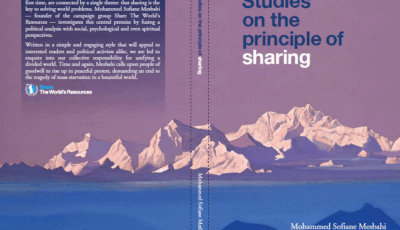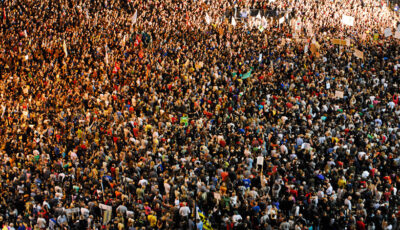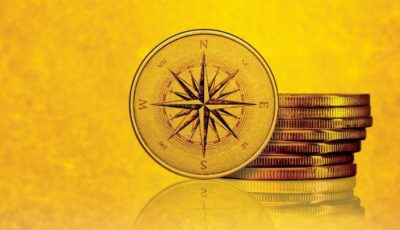This inspiring collection of articles, published together for the first time, are connected by a single theme: that sharing is the key to solving world problems. Mohammed Sofiane Mesbahi—founder of the campaign group Share The World’s Resources—investigates this central premise by fusing a political analysis with uniquely social, psychological and spiritual perspectives.
Editor’s preface
The cry for justice
Commercialisation: the antithesis of sharing
Uniting the people of the world
A discourse on beliefs, ideologies and ‘isms’
An enquiry into the meaning of sharing food
Rise up America, rise up!
Christmas, the system and I
Endnotes
Following below is a sample chapter of the book. A print version is available in paperback from retailers worldwide, including from STWR’s online shop. Translations of the chapters are also available in German, Japanese, French, Spanish, Slovenian and Italian on our website.
.
These seven articles were originally published over the course of 2011 to 2014, during the momentous revolutionary period that followed the global financial crisis. Much of the writing speaks to that sudden democratic awakening of society, when public uprisings and mass occupations became a significant force for change on the world stage. But the essential vision contained within these pages goes far beyond that single historical moment and has even greater relevance and urgency today.
Each article or ‘study’ reads like a joint enquiry between author and reader, leading us both to investigate the meaning of sharing as a solution to world problems—not only in an economic sense but also from social, psychological and spiritual perspectives. The book can be read as a series of self-contained and separate commentaries, or as interlinked chapters that explicate the repeated themes from many angles.
One theme Mesbahi constantly returns to is Article 25 of the Universal Declaration of Human Rights. First adopted by the United Nations General Assembly in 1948, this upholds everyone’s right to an adequate standard of living—including food, housing, healthcare and social security. Finally guaranteeing these basic entitlements for all people is central to our vision at Share The World’s Resources (STWR), informing our wider educational and campaigning work as a civil society organisation. The collected writings in this book help to elucidate that immense, all-embracing vision which also underpins Mesbahi’s later works—particularly our flagship publication, ‘Heralding Article 25: A people’s strategy for world transformation’.
What you are about to read should not be considered a volume of academic essays. Perhaps it is better described as an inspirational teaching for how to bring about a more inclusive, just and equal world. By repeatedly focusing on the need for people to unite through unceasing demonstrations on behalf of the world’s majority poor, we are also called to participate in this great planetary endeavour ourselves. For as Mesbahi makes clear: ‘Without this vital missing factor in modern world affairs, there is no other way out of the critical impasse that faces humanity in the short years ahead.’
London, UK, September 2020
The cry for justice
.
“If only one tear is shed for others out of
compassion, life in its eternity will speak
about your loving heart to all the stars
that you can see.”
.
All the commentary from expert analysts about the melting financial system give almost no insight into what is really happening in the world today. Countless articles are written about how to fix the economy and restore growth to the system, but they are only relevant to a system that was never sustainable and is now coming to an end. What we call ‘the system’ has become so complicated that it appears to have a life of its own, and not even the most sophisticated economist understands what is going on anymore. Few policymakers speak in terms that mean anything to the ordinary person who is struggling to find or keep a job, make ends meet and provide for their family. The disconnection between the worlds of powerful politicians in their private meetings and the everyday lives of the people they are called to serve is more apparent than ever before. But at the same time, something profoundly new is happening throughout the world that requires a much simpler way of looking at things if we are to comprehend what is taking place.
The protests arising in almost every country are a magnificent sight, but it is important to recognise that every one of us who participates in protests against ‘the system’ is also implicated in the mess created by bankers and politicians. Without exception, we are all part of the system. Unless we recognise that society is an extension of ourselves, our protests could lead to tremendous chaos and violence as the economic situation continues to worsen, while political parties of both left and right fail to provide an answer to increasing social problems and inequalities. The system is made up of ordinary people like you and me, of men and women with families and children, which is why it is imperative not to attack ‘the system’ when this would be tantamount to going against each other.
In modern history many governments have tried, with good intentions, to completely change the system. This change was always imposed on the basis of a political ideology, but the time has come when ideologies are not needed any more. There was nothing inherently wrong with the principles underlying capitalism, socialism and communism, but governments abused these principles with an imposing and arrogant attitude towards their people in the name of a belief. Today, more and more people are becoming conscious of the need to be free from these political ‘isms’ that have caused so much suffering and conflict throughout the world. More than a decade after the new millennium it should appear inane to call oneself a communist, a socialist or a capitalist, or to believe that freedom can be acquired through wearing a uniform—in other words, that we can destroy one ideology by replacing it with another.
Witnessing the uprisings and demonstrations that are now taking place, we could say in a literal sense that people are becoming more aware. Without any condescension, this is one way to put it—that more and more people are starting to think for themselves, and are no longer relying on what other people tell them to think, are no longer ‘believing in a belief’. Our education systems do not help us to understand that ideologies are a denial of human freedom; they do not teach us what it means to be free within. But today, people are realising this intuitively for themselves. Hence all the changes that are happening so dramatically across the world.
Please observe the so-called Arab Spring; millions of people courageously freed themselves from dictators who had imposed beliefs and ideologies on their people for decades, but now that the revolution has unfolded many different factions are trying to impose all manner of new beliefs upon each other. In Egypt, the army quickly tried to rebuild the old system based on power and privilege even when a million people again took to the streets. In Zucotti Park and at St Paul’s, as in any mass protest movement, there were also many intellectual factions with different beliefs all combating for attention within the crowd. Let us not be fooled. Democracy is closely related to freedom, but the kind of democracies we have today are an imposed and controlling form of social organisation. We will only know the true meaning of democracy when each and every one of us experiences the freedom that comes from within, and not before. At the very least, it is not enough to vote for a political party once every few years when no leading politician has an answer to our social and economic problems.
As we stand with the new movement of protestors, we must look closely at what it means when we cry for justice. There are many stories now being reported about the rich people who are accumulating wealth in the midst of economic austerity, which of course leads to rightful anger against bankers and the unbridled greed that has been sanctified in modern-day society. But which is the greater sin: the banker’s bonus, or the fact that thousands of people are dying from hunger each day in a world of plenty? The global economy is sinking and so the people’s voice is rising, but why are there no demonstrations in our city squares when people are dying from hunger?
It is because we do not see the interconnection between our different lives. We have not been educated to see the very poorest people as our brothers and sisters, or to see the world as an interdependent whole. A child is not taught how to be in touch with himself, with his own nature, but is rather conditioned in how to become a ‘somebody’ in a dysfunctional society based on competition and stress. In universities we may study many books about the history of human civilization, philosophy, politics, the arts and so on, but we are not taught in the simplest human terms how to serve other people. The consequence, in a global and collective sense, is that we do not understand that we are one humanity, that we are all dependent upon each other, and that we have a responsibility to care for those less fortunate than ourselves.
The protests erupting in Wall Street and elsewhere could have happened a long, long time ago. So why now, all of a sudden? Because millions of people in the affluent countries are beginning to feel the pinch. Even when we cannot pay our mortgages, however unjust the circumstances, why don’t we think about those who are poorer than ourselves? There are many different levels of poverty, and as we know in the USA and other rich countries there are an extraordinary number of people living in relative poverty—but how about the kind of poverty when you cannot find enough food for you or your children to eat? When you do not have shelter, or money, or even the most basic form of healthcare to prevent you from dying? We are all familiar with the phrase ‘a crime against humanity’, but why doesn’t the international community ascribe this phrase to the thousands of people dying from hunger each day, or to the 1.4 billion people that the World Bank cursorily describes as ‘the extreme poor’?[1]
Now that the economic system is collapsing, every nation has to begin to restructure itself, and we can all play a part in this process. But we have to understand that this begins with ending hunger. We cannot even look at the word injustice without first looking at the problem of hunger. It is as if we have bought a new home, but first we must clean up the mess left by the old tenants. That mess is the problem of hunger. We cannot go out into the world and campaign for justice for ourselves when our own children are waiting at home, abandoned by us and hungry. The world is in a state of disrepair and requires a dramatic process of rehabilitation, but first we have to look after our own children, who are the hungry people of the world.
After 9-11 happened, a huge army was sent to Iraq over land, sea and air within a month. Notwithstanding the terrible consequences of that illegal war, just imagine if all that manpower and expertise was redirected to giving life, not taking life away? Imagine if the world’s military resources were mobilised to eradicate hunger as a foremost priority—above geopolitics, defence or corporate profit. Recently, NATO sent hundreds of millions of dollars effectively flying through the air to stop Gaddafi from massacring his own people.[2] Whether or not we agree that this was a necessary action, there is another question we should ask: why doesn’t NATO send all their planes and armies into Africa to help feed the people? Many more people in Benghazi may have died without outside intervention, but at the same time thousands of people were dying from hunger and poverty in other parts of the world, and continue to die each day. Why doesn’t NATO prevent Al-Shabab from diverting aid away from the Somalian people?[3] We all know the answer: because there is no strategic or economic interest for them there. But this is not a cause that motivates people to protest en masse in the streets, demanding an answer from our governments: ‘Why don’t we help the hungry millions?’
Even the church has failed in its duty to shake the world’s conscience about the blasphemy of hunger, despite there being no cardinal rule to prevent the clergy from demonstrating in our city squares for freedom from want. When protesters camped outside St Paul’s Cathedral in London, many banners posed the question ‘What would Jesus do?’ We might wonder how the church would respond if Christ were to reappear today as a ‘divine activist’ moving among the mass rallies for freedom and justice across the world. Unfortunately, when we label the very few people who attempt to do the right thing for the world as ‘activists’, we infer that an activist is somehow different and set apart from the ordinary citizen. The media and advertising industry encourage us to adopt such labels, which enable us to separate our social identities and not feel connected to the suffering and vast inequity that plagues the earth. It is these same divisions in our consciousness that allow us to say: ‘There has always been hunger, and always will be’. Or to nod our head at the warnings of environmentalists, and then to say: ‘But it is naive to believe that we can change the world’. In this sense, the word activist really means ‘the one whom nobody listens to’.
An understanding of justice also requires awareness, which means to see things clearly, to think for oneself, to not have a belief in a belief. Now that the old order is collapsing and no government knows what to do, we can no longer point the finger at our politicians alone. We like to say ‘it’s the fault of my government’, but are we not also to blame for the world situation through our own lack of action and our complacency? As we have seen in the Middle East, when two million people stand in the street and peacefully shake their fists the government has no choice but to listen or leave office.
*
Let us try and understand, in the simplest terms, what this means for the economist and the politician. Since it is obvious that our economic, social and political systems need to be totally restructured, the correct responsibility of governments is to redesign these systems specifically so that no-one dies of hunger. In the first instance, this requires international cooperation for an emergency program of redistribution unlike anything we have seen before. Such a program cannot be based on charity, which has absolutely nothing to do with justice. Charity is of course critical in the kind of world we have today where billions of people are suffering in poverty, but the necessity of charity is a sad representation of public complacency. An emergency program cannot be based on the existing premise of ‘let’s do our best to feed the starving people’, but must rather be initiated with the understanding that ‘this should never happen again’.
There is plenty of food and resources to feed, clothe, house and care for everyone in the world, as long stipulated as a human right in Article 25 of the Universal Declaration.[4] This Article, which is the expression of justice in its strictest sense, must become the law for every nation. Just as there are laws to obey when a country joins the European Community, the human rights articles of the United Nations must legally obligate member states to collectively prevent any person dying from hunger in any country. Article 25 must be translated into the rule of law, backed up by the force of public opinion around the world. The voice of the people should be heard and represented in the United Nations—that is what the United Nations is for. It should come to represent the heart and minds of the people. This will inevitably take a long time, and each nation should continue to grow within its own traditions. But as a very first step, enlightened politicians and the public should voice their demand for an emergency redistribution program to be initiated under the aegis of the United Nations General Assembly, which should become the most important work that the United Nations has ever undertaken.
The logistical details of such a program will be an immense challenge for governments to negotiate and plan, but there can be no gainsaying its broad mandate. Again and again we see humanitarian emergencies with the same old story, as in Turkey’s earthquake recently or the floods in Thailand: not enough resources, not enough support, not enough aid to go around. Even in the richest country with the largest military, people in New Orleans were left to fend for themselves in the aftermath of Hurricane Katrina, calling out to the world ‘Where’s President Bush?’ When we want to protect our own interests or go to war, everything happens so quickly—we have all the equipment, all the weapons, all the manpower, all the money. But when it comes to the suffering of poor people, all of a sudden money is non-existent. This is the trend that must be reversed. This is why the prevention of human deprivation, whatever its cause—poverty, conflict or natural disaster—must be guaranteed by an international authority. Think of it like a worldwide emergency services, funded by contributions from every nation. We should not even consider this to be a ‘humanitarian’ operation, which has connotations too similar to charity. Rather, these programs should be permanently structured into our reformed global governance institutions and enshrined in international law.
None of this will happen without an unparalleled uprising of public support. A solution to the world’s problems cannot be brought about by any political party or ideology, and can only happen through a free, united and single voice of the people of the world. Ideologies and belief systems have no further part to play in the changes that lie ahead. A healthy revolution in fact begins with the act of wanting to be free of all ‘isms’ and ideologies that constantly harass human free will and prevent us from demonstrating love between people of every race and culture. To be free from beliefs and ideologies will naturally allow our minds the space to know ourselves, which in turn will give us the ability, the energy and the love to identify ourselves with others.
But it is futile to become ‘anti’ any belief or ideology, such as to stand against capitalism. It is time to put capitalism in its right place and redistribute the world’s resources to where they are needed most. Capitalism came very naturally to us—it is natural to say ‘this is yours, and this is mine’, but the time is coming when we must say ‘let’s share what we have’. Sharing means ‘to be with’, because we cannot share with another person without silently acknowledging that we are together, that we are here to help one another. In this sense, the principle of sharing has the intrinsic propensity to unite and not divide.
The beauty of sharing is that it does not belong to any political party or ‘ism’, but to the people of the world. It doesn’t belong to the socialist party, or the communists, or anyone else. It is the freeing agent from a painful history of ideologies and beliefs that have caused such tremendous conflicts with each other. When we understand that the principle of sharing is fundamental to our survival but tragically neglected at every level of society, we will recognise that sharing is the surest guide to justice and peace. Then we will each know ourselves as an ambassador for humanity, because above all nations is the united people of the world.
What could this mean for the people protesting in New York and every other city? These protesters know very well that we need to redistribute wealth, that we need to stop money from going through the wrong hands—to the arms industry in particular. Whichever way you look at it, war must now come to an end. Nobody wants war anymore—or rather, no country can afford to go to war anymore as the world economy continues to melt and collapse. The protesters are also very aware that there is more than enough money to go around, but that it is hoarded by powerful families and corporations, even by the governments who spend it injudiciously. So each nation has to redistribute its wealth and resources more fairly among its own population.
But we also need to redistribute resources globally, initially on an emergency basis to all people who are without the basic necessities of life, and eventually through new international economic arrangements no longer based on competition and material gain. These longer-term transformations will require visionary thinking and a new kind of economist, and it may take many years to restructure our global governance systems. Through the sharing of world resources, laws will have to change by the shovel; everything will need to be simplified. This is why we should not waste our time listening to the advice of the orthodox economist or establishment politician, as their theories are outdated and irrelevant to the coming era. When the principle of sharing begins to influence government policy, the present economic system will naturally change or melt away. Both cannot coexist, for one is divisive in its complexity and the other is unifying in its simplicity.
No-one is immune from the changes that lie ahead, so let us not work against the system, but together let’s transform it. This requires an attitude of confidence that we really can transform the system, and that a better world is possible. And this requires awareness, and togetherness, and more and more perseverance—especially perseverance. As we have seen, governments instinctively abhor any uprising of the people because their power is soon put in jeopardy, so their tactic through the police is to discourage even the most peaceful form of protest. So we have to carry on and on, otherwise change is impossible.
We are already becoming a powerful force, structuring ourselves and becoming organised into one voice. Every demonstration around the world should express, in its own creative way, a refusal to carry on living as before. But we cannot change the world without first looking after the most vulnerable people, which means that we have to demand from our governments an immediate end to hunger, everywhere. A true social revolution has to have morality at its heart, which is why an end to life-threatening deprivation in every country must become our first priority. The key is for everyone to raise their voice for greater economic sharing, and to continually push the boundaries of our demands until governments implement this unifying principle into world affairs. Now is the time, as it always has been.
Originally published on sharing.org, December 2011
.
Thank you for reading this sample chapter. Click here to purchase the printed book from our online store
[1] The statistic of 1.4 billion people struggling to survive on less than US$1.25 a day was correct when this article was originally written in late 2011. According to the World Bank, 734 million people now live below an adjusted poverty line of $1.90 a day, or 10 percent of the world’s population. However, these figures are long criticised on many counts, not least for failing to reflect how much financial income is needed to fulfil the right to “a standard of living adequate for… health and well-being” (Universal Declaration of Human Rights, Article 25.1). More than 40 percent of humanity lives on less than $5.50 a day, for example, including some 90 percent of the population in South Asia and sub-Saharan Africa. A multidimensional view of poverty—wherein other aspects of deprivation are included, such as access to basic utilities, healthcare, education and security—reveals a more alarming truth: that the vast majority of all people in the developing world still live without sufficient means for a healthy and dignified life. To learn more on these issues, visit sharing.org
[2] This refers to the 2011 military intervention in Libya led by the United States and its NATO allies, ostensibly to protect civilians in response to events during the Libyan Civil War. The operation ended in late October 2011 following the capture and death of Libya’s deposed leader, Muammar al-Qaddafi.
[3] In 2011, a severe drought affected East Africa which led to a food crisis across the entire region. The greatest emergency was in southern Somalia, an area then under the control of the Islamic militant group al-Shabab. Many international aid organisations and UN agencies were driven out, while those remaining were often forced to pay illegal bribes, endure attacks on staff and accept the diversion of food supplies to fighters. Half of the population of Somalia were faced with starvation during the height of the crisis, which eventually claimed over 250,000 lives.
[4] Article 25 of the Universal Declaration of Human Rights (General Assembly resolution 217 A): (1) Everyone has the right to a standard of living adequate for the health and well-being of himself and of his family, including food, clothing, housing and medical care and necessary social services, and the right to security in the event of unemployment, sickness, disability, widowhood, old age or other lack of livelihood in circumstances beyond his control. (2) Motherhood and childhood are entitled to special care and assistance. All children, whether born in or out of wedlock, shall enjoy the same social protection.
Mohammed Sofiane Mesbahi is the founder of Share The World’s Resources (STWR), a civil society organisation based in London, UK, with consultative status at the Economic and Social Council of the United Nations. STWR is a not-for-profit organisation registered in England, no. 4854864.
Editorial assistance: Adam Parsons
To join our campaign for Article 25, please visit: sharing.org/Article25campaign







